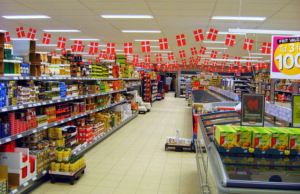News
Grocery prices to remain high in Denmark
This article is more than 2 years old.
Opinion divided over whether politicians should intervene

The time to celebrate is not here (photo: Tomasz Sienicki)
Are you looking forward to groceries becoming cheaper?
Well, hang in there because the prices are not about to drop. On the other hand, only one in ten retail stores intends to raise prices, according to Danmarks Statistik. Most retail stores expect an unchanged level in prices.
“You shouldn’t get your hopes up that prices will actually fall,” Brian Friis Helmer, a private economist at Arbejdernes Landsbank, told Ritzau.
The new figures show that grocery prices remain at a high level since inflation rumbled away in 2022. Supermarket prices are 18 percent higher than in January 2022, when they started to rise.
Profits going up
Politicians are getting increasingly critical that grocery stores are not lowering prices. Why has it happened with electricity and petrol, questions Enhedslisten’s Pelle Dragsted, but not with food?
“Someone is profiting. For example, in Arla’s accounts you can see they have some very nice profit margins. Internationally, an important debate has arisen among economists about what is called profit-driven inflation,” explained Pelle Dragsted in the radio program Det Røde Hjørne.
But is it a matter for politicians?
Socialdemokratiet former minister Christian Rabjerg Madsen can’t see a reason for politicians to interfere.
“I am frustrated that the prices are still expensive, but at Christiansborg there is no political button that you can press to make it disappear,” said Madsen.
He points out that prices are already on the way back and assures that the government will crack down on any crooks who keep prices artificially high.
Political action in France and Sweden
Dragsted emphasises that other European countries have been successful at knocking down high prices.
“In France, the government called the entire food industry to a crisis meeting and threatened to intervene with price controls, which caused them to lower the prices of 500 products on their own,” Dragsted said.
Swedish chains, meanwhile, lowered their prices before an arranged meeting with the ministry had even taken place, added Dragsted.










































